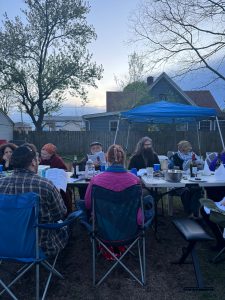Notre Dame’s quick and easy solution to getting rid of students protesting the University’s complicity in a genocide appears to be throwing them in jail. What remains the most confusing though, is ND’s continued insistence that it is truly a place for diversity and dissent. After recently praising University police and administrators for their “measured and appropriate” response in arresting and detaining 16 students and one alumnus, Father Jenkins took to the commencement stage to widely proclaim that dissenters should not be silenced or demonized. “I encourage you to express your convictions, join with those who agree, and work diligently for what you believe, but I urge you also to be suspicious of rhetoric that casts those who disagree as evil. I urge you to not dismiss dissenters.” What would make these words more powerful were if they were put into practice. This discrepancy reeks of hypocrisy.
Out of 17 of those arrested Thursday night, three were detained in St. Joseph County Jail until Friday noon.
The holding cell was frigid—from the A/C blasting in the room to the concrete seats and walls. Blankets and mats were only permitted after seeing the nurse and moving into individual cells. However, officers were consistently unable to give information on where the nurse was. Our jail garments were extremely thin, so most of us wore our shirts over our arms. I fell in and out of sleep, scrunched up with my head inside my shirt and hugging my legs to retain body heat. The other women slept in fetal positions. In fact, for a few days after I experienced body aches and shoulder pain because of the discomfort and cold. When I asked for water, I was told to drink from the cell’s sink. The only thing I consumed in those 12 hours was a small carton of 1% milk. At a certain point, my hunger and dehydration were dulled.
Five hours passed, and a tentative 8am nurse visit dragged onto 10am. We were finally brought out to provide a urine sample and to answer a slew of health-related questions. I was thankful for the slight increase in temperature outside the cell, but immediately following the visit we were forced back in again. No individual cells, no blankets or mats.
Outside, a woman screamed for hours. While being booked in, I asked the officer if she was okay. He responded that she had already been there for a day and most likely had autism. Because of the growing urgency of her pleas, I inquired if a mental health specialist would come to calm her down. “We are the mental health people,” he bluntly told me, “Some people just need to tire themselves out and then they’ll be quiet.” Someone a few cells down yelled, “Shut up bitch,” and the officer next to us laughed.
At around 12pm, we were brought to a waiting area in preparation for our release. A few men at their cell windows stared at the other female student and I. We passed by a man who suggestively called out “hello.” He sang vulgar, graphic songs out loud—something along the lines of wanting his “dick sucked in the shower” and to “see some tiddies.” Four men in cells surrounding us bombarded us with questions, asking what we were there for and if they could get our numbers. We sat there in silence, trying to ignore them. When we were called into a nearby room to retrieve our belongings, the officer sorting our items was interested in guessing what Asian I am. His wife is Asian too, he said.
Two major critiques arise from this experience. One—more broadly—of this country’s incarceration system and the inhumane conditions it forces those detained to endure. I was only in jail for 12 hours, but I witnessed and, to some extent, sustained the complete negligence of basic mental and physical needs. Two—more specifically—of Jenkins’ statement that the 17 arrested and three detained did indeed encounter a “measured and appropriate” response by the University. To quote Jenkins himself, “I urge you [to not] dismiss dissenters.” I urge everyone to open their eyes to what ND has been doing to silence peaceful protesters, to open their ears to what exactly we are fighting for, and to open their hearts to the people in Gaza. There is nothing good about a force that forces its students and alumni into handcuffs and jail cells.



